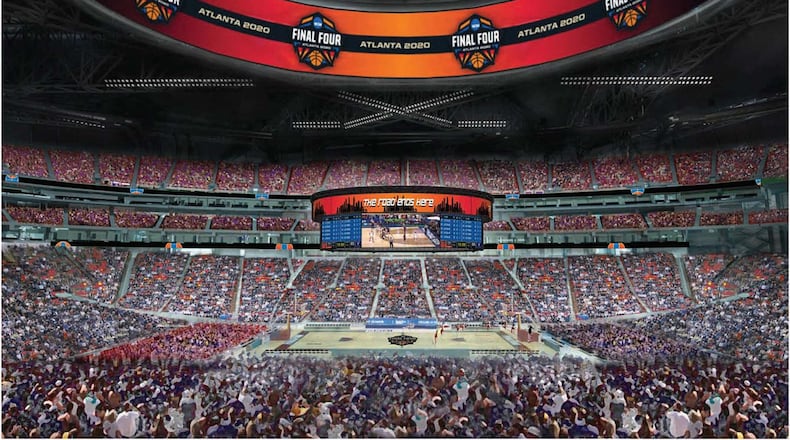As NCAA officials continue to prepare for the Final Four in Atlanta, they are eager to see the transformation of Mercedes-Benz Stadium into a basketball venue.
“I’m curious (how it will turn out), but I’m not nervous about it,” Dan Gavitt, the NCAA’s senior vice president of basketball, said during an interview Wednesday in Atlanta. He expressed confidence in the abilities of NCAA consultants, contractors and staffers to “make this puzzle fit” in the 2-1/2-year-old stadium.
“I know it will work well,” he said.
The Final Four – the semifinals are April 4, followed by the championship game two nights later -- will mark the first basketball games played in Mercedes-Benz Stadium. The NCAA and the Atlanta Basketball Host Committee, at a Wednesday news conference detailing plans for Final Four fan events, showed a new architectural rendering of The Benz in basketball mode.
An elevated basketball court will be placed in the center of what is normally the stadium’s football or soccer field. A center-hung scoreboard, weighing 140,000 pounds, will be installed 100 feet above the court and 100 feet below the stadium’s famous halo-shaped video board. An elaborate temporary seating system, containing about 25,000 seats, will be installed over much of the existing lower bowl to improve basketball sight-lines and extend seats to the court.
The NCAA uses variations of the portable seating system at the Final Four each year. But the “geometry” of Mercedes-Benz Stadium will require a larger “build-out” than previous Final Fours, Carl Adkins, executive director of the Atlanta host committee, said.
The stadium is expected to have a Final Four capacity of more than 80,000, which would put the event in position to break its all-time attendance record.
The NCAA typically installs a temporary scoreboard above the court for Final Fours in NFL stadiums, but the organization gave “serious consideration” to not doing so this year, Gavitt said, because of the halo-shaped video board built into the roof structure.
“Our strong sense is that the venue would have preferred not to have a center-hung and just showcase what is a spectacular asset in the halo board,” Gavitt said.
But the NCAA Men’s Basketball Committee and staff decided it would be better to hang a scoreboard in a position where players and coaches are accustomed to seeing one.
“From an experience standpoint, it’s kind of tradition-based,” committee chairman Kevin White, the athletic director at Duke, said of the center-hung scoreboard. “Why deviate at that point in the season? It made no sense to do that, at least from the committee’s standpoint.”
Said Gavitt: “It’s a tremendously different experience playing in a stadium versus playing in arenas the entire rest of the season. We’re trying to make it as (similar) to what they are used to as possible. It brings the scale down a little bit by having something over your head. It gives coaches and student-athletes a chance to know exactly where to find the score, time and the like. We’ll still use the halo board as well.”
The temporary scoreboard will be the same one that was used at last year’s Final Four in Minneapolis, Gavitt said.
The Mercedes-Benz Stadium transformation will occur over the final two weeks of March, when crews will be at work in the building around the clock.
“It’ll be a herculean effort,” Adkins said.
Fans will be able to get a first look at the result April 3, when the Final Four teams will hold free open practices in the stadium. The practices will be followed by the Reese’s All-Star Game, an event featuring some of college basketball’s top senior players.
Other fan events will include the Final Four Fan Fest April 3-6 in the Georgia World Congress Center, the March Madness Music Festival in Centennial Olympic Park April 3-5 and the NCAA Divisions II and III championship games in State Farm Arena on April 5. Admission will be free to the music festival and the Divisions II and III games. Fan Fest tickets went on sale Wednesday for $10 (free for children 12 and under and Capital One cardholders).
“April 3 through April 6, downtown Atlanta is going to be completely transformed,” Adkins said.
About the Author
Keep Reading
The Latest
Featured




